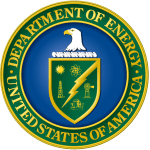DOE CONTRACTS, GRANTS, AND COOPERATIVE AGREEMENTS
DOE Financial Awards are subject to 10 CFR Part 600, subpart D – we happen to be experts.

The Department of Energy (DOE) is concerned with policies regarding energy and safety in handling nuclear materials. It sponsors more research in the physical sciences than any other U.S. federal agency, largely through its system of National Laboratories. Advanced Research Projects Agency-Energy (ARPA-E) is charged with promoting and funding research and development (R&D) of advanced energy technologies, modeled after the Defense Advanced Research Projects Agency (DARPA).
DoE awards come in two variations:
Federal Contract awards
Include procurement contracts used to buy goods or services (which are very similar to DOD contracts)
Federal Financial Assistance awards
Include grants, cooperative agreements and sub-awards (which are very similar to NIH* grants). ARPA-Es, EEREs and SBIR*/STTRs which are awarded as grants or cooperative agreements may or may not contain cost sharing provisions.
DOE AWARD OVERSIGHT – 10 CFR PART 600, SUBPART D
Annual Indirect Cost Proposal
All of DOE’s funding vehicles require this report, which is identical to the DOD annual incurred cost* submission.
Once the annual incurred cost report is submitted, any over-billing for indirect costs may be re-budgeted and spent on direct expenses on the project or must be repatriated. Unlike DOD or NIH, funds are generally not provided for indirect cost* overruns, so it is critical to monitor indirect cost and total award spending.
Contract and Cooperative Agreements
Invoicing must be done through the Vendor Invoicing Payments Electronic Reporting System (VIPERS) administered from Oak Ridge, Tennessee. Federal Financial Assistance provided by a grant award are subject to:
FINANCIAL REPORTS
Funds drawn down from the Automatic Standard Application for Payments (ASAP) system must be reconciled to actual project funding earned and reported on Federal Financial Report (FFR) aka SF-425 on a quarterly basis.
ANNUAL AUDIT OF FOR-PROFIT RECIPIENTS – 2 CFR 200, Subpart F and Part 910
Under Regulation 10 CFR 600.316, when a for-profit recipient has DOE financial assistance awards of $750,000 or more (which increases to $1M for fiscal years beginning after 10/1/24), a Uniform Guidance Audit (UGA) must be performed. This audit is identical to a NIH Uniform Guidance Audit and includes compliance tests, tests of internal controls, and audit follow-up on prior audit findings. The audit report is due nine months after the recipient’s fiscal year end.
ANNUAL PROPERTY INVENTORIES
Similar to an NIH grant, the determination of ownership and disposition of property acquired with government funding, and charged as a direct cost, must be accounted for on an annual basis on the Financial Assistance Property Closeout Certification report.
